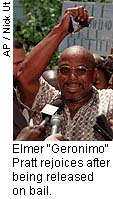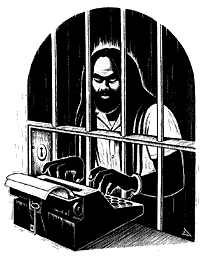
Supplement, 16 June 1997
Black
Panthers in America's Capitalist Dungeons
Geronimo Is Out! Now Free Mumia!
LOS ANGELES--Behind bars for more than half of his 49 years, Geronimo ji Jaga (Pratt) was released June 10 as hundreds of supporters in the Santa Ana courtroom cheered and many more around the city of Los Angeles gathered to celebrate his release. The former Black Panther Party Minister of Defense has been jailed for the last 27 years after being set up on murder charges by the LAPD and FBI as part of the sinister COINTELPRO campaign targeting black radicals. Geronimo hugged his daughter, who he had never seen outside of prison and who was graduating from high school that afternoon, and said the first thing he planned to do was visit his 94-year-old mother in Louisiana.
 Geronimo pointed out
that in the United States today, there are "political
prisoners on top of political prisoners. I'm only one of a
great many that should be addressed." He was held in
prison for so long, he said, because authorities "framed
me for a murder I didn't do. They had to continue to lie
because if they stopped, then an investigation would have
taken place which would have exposed them." He described
the "justice" system that kept him behind bars for 27
years as "everything from racist to classist to
sexist...and I'm talking about the whole shebang, not just
the judiciary." FBI director "J. Edgar Hoover sent a
directive for his agents, to cripple, neutralize the
Panthers," ji Jaga said. "I was personally targeted. We
have those documents now" (Los Angeles Times, 11
June).
Geronimo pointed out
that in the United States today, there are "political
prisoners on top of political prisoners. I'm only one of a
great many that should be addressed." He was held in
prison for so long, he said, because authorities "framed
me for a murder I didn't do. They had to continue to lie
because if they stopped, then an investigation would have
taken place which would have exposed them." He described
the "justice" system that kept him behind bars for 27
years as "everything from racist to classist to
sexist...and I'm talking about the whole shebang, not just
the judiciary." FBI director "J. Edgar Hoover sent a
directive for his agents, to cripple, neutralize the
Panthers," ji Jaga said. "I was personally targeted. We
have those documents now" (Los Angeles Times, 11
June).
 How Geronimo was framed by the LAPD and FBI
has been well known for years: the surviving victim's
identification of two different men as the killer before
he ever saw a photo of Geronimo was suppressed at the
trial; the logs of three different federal wiretaps of an
Oakland Panther house, which show that Geronimo was there,
400 miles from the shooting, and had called L.A. Panther
headquarters two hours before the murder, had
"disappeared." Key "witness" Julius Butler, a fink and
police provocateur, repeatedly lied on the witness stand,
denying he worked for either agency. Evidence uncovered by
private investigator James McCloskey powerfully
demonstrated Geronimo's innocence. McCloskey's
investigation linked two petty criminals on the fringes of
the BPP to the Santa Monica murder.
How Geronimo was framed by the LAPD and FBI
has been well known for years: the surviving victim's
identification of two different men as the killer before
he ever saw a photo of Geronimo was suppressed at the
trial; the logs of three different federal wiretaps of an
Oakland Panther house, which show that Geronimo was there,
400 miles from the shooting, and had called L.A. Panther
headquarters two hours before the murder, had
"disappeared." Key "witness" Julius Butler, a fink and
police provocateur, repeatedly lied on the witness stand,
denying he worked for either agency. Evidence uncovered by
private investigator James McCloskey powerfully
demonstrated Geronimo's innocence. McCloskey's
investigation linked two petty criminals on the fringes of
the BPP to the Santa Monica murder.
Basing himself solely on the evidence that the prosecution withheld about its witness Butler, Judge Dickey overturned the verdict against Pratt on May 29 and then released him on $25,000 bail. (Attorney Johnnie Cochran ironically suggested the amount to symbolize the quarter century Geronimo had spent in prison.) Julius Butler's claim that Geronimo had "confessed" the murder to him was key to the frame-up. Butler first made this claim in a "letter" to the cops two years after the killing and two days after Geronimo had expelled him from the Panthers for being a police informer. During last December and January, hearings in the Santa Ana courtroom produced 2,400 pages of testimony focusing on Butler's ties to the D.A., the LAPD and the FBI.
Butler blatantly lied on the stand, telling the jury he had never been an informer. Yet this former L.A. deputy sheriff and convicted criminal had been an LAPD snitch since 1966, had at least 30 documented meetings with FBI agents during 1969-70, and became an informant for the Los Angeles District Attorney's office (which prosecuted Geronimo) with the FBI's permission. The government owned this stool pigeon. A retired L.A. police captain called Butler an "agent provocateur." The D.A.'s office gave Butler $200 to buy a gun, and pulled strings to get the convicted felon admitted to the California bar. Now a "respected citizen," Julius Butler rose to become the chairman of the board of the First AME Church in South Central Los Angeles, where he networked with Hollywood celebrities and even the U.S. president.
Meanwhile, the capitalist "justice" system stole Geronimo's life from him. He was thrown into solitary confinement for eight and a half years in Folsom Prison and San Quentin, where he was confined to a 4-by-8 cell for 23 hours a day. In his memoirs, Journey to Justice, Johnnie Cochran recounts visiting Geronimo in San Quentin, where the imprisoned Panther leader was dressed in a white jump suit with a huge black "X" stenciled on the back. "This thing on my back is a target," said Geronimo. "When I walk back across that yard, if I fall down they will shoot and kill me." This was where George Jackson was shot down by prison guards only a couple of years before. Over the years Geronimo was subjected to endless retaliatory persecution by vindictive prison authorities, particularly after the injustice of his case had been revealed on national TV. Now, fuming that the 1972 verdict was overturned, D.A. Gil Garcetti says his office will appeal the ruling against Geronimo.
It's not just that evidence was withheld, as Judge Dickey ruled, but the whole case against Geronimo was a frame-up, part of a top-level government conspiracy to destroy the Black Panther Party. As one FBI memo put it, the "purpose of counterintelligence action is to disrupt the BPP and it is immaterial whether facts exist to substantiate the charge." FBI chief J. Edgar Hoover outlined the theme of COINTELPRO: "The Negro youth and moderate[s] must be made to understand that if they succumb to revolutionary teachings, they will be dead revolutionaries." These were not idle words--38 Panthers were killed outright by the state. The Panthers were labeled public enemy number one and "the greatest threat to internal security." Of 295 FBI operations against black organizations, 233 of them were against the Panthers.
As Nixon escalated the war on black radicals, Geronimo was one of the COINTELPRO's prime targets. A recent article in the LA Weekly (18 April), titled "Just the Facts," detailed the conspiracy. Geronimo was repeatedly arrested by the LAPD on one pretext after another. An FBI circular in May 1969 called for charging Pratt with seditious conspiracy and insurrection under the anti-Communist Smith Act. He was designated a "Key Black Extremist" and elevated to Priority I status on the National Security Index of those deemed by the feds to pose a "threat" to the government. An FBI memorandum called for an operation "to challenge the legitimacy of the authority exercised by ELMER GERARD PRATT." A June 1970 FBI memo called for "constant consideration" of using "counterintelligence measures" aimed at "neutralizing PRATT as an effective BPP functionary." In December 1970, he was arrested on the frame-up murder charges.
This whole set-up operation was revenge for the fact that the government had failed in its attempt to murder Geronimo a year earlier. Four days after Chicago police gunned down Panther leaders Fred Hampton and Mark Clark, the cops launched an early morning assault on BPP offices in Los Angeles. On 8 December 1969, more than 140 SWAT and regular cops surrounded the building and pumped thousands of rounds into it for five hours. Because of spinal injuries he sustained in Vietnam, Geronimo was sleep ing on the floor and escaped the bullets aimed at his bed. Taking the Panthers' call for armed self-defense seriously, the decorated Vietnam War veteran had organized measures to defend the office. Returning the police fire, the L.A. Panthers were able to keep the cops from reaching the second floor, holding them off long enough for a crowd to gather and thwarting police plans for a cold-blooded massacre. Having failed to assassinate Geronimo, they gave him the living death of prison.
Ji Jaga said he believes that Olsen's slaying was actually targeted to frame his predecessor as leader of the Panthers in Los Angeles, Alprentice "Bunchy" Carter. Carter was killed in a 1969 provocation against the Panthers instigated by the dubious US organization of Ron Karenga which was heavily implicated in the feds' "dirty tricks" campaign. At the courthouse, Geronimo said he was determined to "finally lay bare the facts so that everyone could see who killed Mrs. Olsen.... She was like a comrade of ours. No one has championed her cause. She was just forgotten." Olsen and her husband were opponents of the U.S.' war in Vietnam.
Commenting on Geronimo's release, Johnnie Cochran called it "a great day for justice in America." Stuart Hanlon, the Bay Area attorney who has dedicated his efforts to defending Geronimo for many years, had a different view, saying: "The justice system that kept him in jail for 25 years can't be justified by one judge's ruling" (Philadelphia Inquirer, 11 June). The torment inflicted on Geronimo ji Jaga Pratt underlines the class nature of the racist, capitalist "justice" system, which will go to any lengths to destroy revolutionary fighters. J. Edgar Hoover first came to prominence in the post-World War I "red scare" round-ups of the syndicalist IWW "Wobblies" and the nascent Communist Party, and he orchestrated the McCarthyite witchhunt after World War II. In this deeply racist country, which was founded on slave labor, the capitalist rulers are most ruthless when they sense the spectre of black rebellion, from the army's 1922 aerial bombing of the Tulsa, Oklahoma ghetto to the murderous vendetta against the Panthers to the 1985 police bomb that incinerated the Philadelphia MOVE commune.
There is no justice in the bourgeois courts for working people and minorities. The cops and courts exist to preserve the rule of capital and to repress the exploited and oppressed in the interests of profit system. In Clinton's America there is a "bipartisan consensus" of the capitalist parties to intensify state repression, particularly escalating the use of the racist death penalty. The only way to put an end to this barbaric system is through international socialist revolution.
Geronimo called himself a "prisoner of war," of the FBI's war on black America. To defend class war prisoners like him it is necessary to mobilize the working class, the only social force with the power to defeat the capitalist state and its repressive organs. Around the U.S. and internationally, the fight for Geronimo's freedom was taken up by a number of organizations, particularly the Partisan Defense Committee and the West Coast-based International Committee to Free Geronimo Pratt. It is significant that a wide range of unions endorsed these efforts, including the SEIU, ILWU longshore and warehousemen, including locals in both L.A. and the Bay Area; the American Postal Workers Union; the Alameda Central Labor Council, the California Teachers Association and National Education Association, Chicago ATU transit workers, and others.
Geronimo is out on bail, but he still faces the same frame-up charges that put him behind bars for more than a quarter century. All charges against Geronimo must be dropped now! And his release must spur efforts on behalf of all of America's class war prisoners. As he walked out of jail, Geronimo called for justice for other victims of this racist system, noting in particular Ruchell McGee, who was imprisoned together with Angela Davis, and Hugo Pinell, the last of the San Quentin Six who has been imprisoned for more than three decades.
The media claims that "Pratt may just be the last victim of the old FBI mentality" (Los Angeles Times, 8 June). Wrong. Many other victims of FBI frame-ups are still in the capitalist dungeons, among them former Omaha Panthers Ed Poindexter and Wopashitwe Mondo Eyen we Langa (David Rice), American Indian Movement leader Leonard Peltier, antiwar radicals Jaan Laaman and Ray Luc Levasseur, the Philadelphia MOVE prisoners and former Black Panther and MOVE supporter Mumia Abu-Jamal, who has become the focus and symbol of the fight to abolish the racist death penalty.
Geronimo spoke from prison against the threatened
execution of Jamal: "From behind the walls of these
California slave  camps,
I send you greetings rich in spirit and determination. At
this time I urge everyone to concentrate and focus all
their energies into a united effort to save Mumia
Abu-Jamal's life.... Now it is time for us to embrace him.
To sound the alarm and say with our time and energy: NO WE
WON'T LET THEM KILL MUMIA!" Last week, greeting Geronimo's
release, Mumia said: "His only crime in the words of the
authorities was 'he is still a revolutionary.' That is why
they cased him, framed him and held him so long." We must
build on the impact of Geronimo's release to intensify the
fight to win freedom for Mumia!
camps,
I send you greetings rich in spirit and determination. At
this time I urge everyone to concentrate and focus all
their energies into a united effort to save Mumia
Abu-Jamal's life.... Now it is time for us to embrace him.
To sound the alarm and say with our time and energy: NO WE
WON'T LET THEM KILL MUMIA!" Last week, greeting Geronimo's
release, Mumia said: "His only crime in the words of the
authorities was 'he is still a revolutionary.' That is why
they cased him, framed him and held him so long." We must
build on the impact of Geronimo's release to intensify the
fight to win freedom for Mumia!
Internationalist Group
16 June 1997